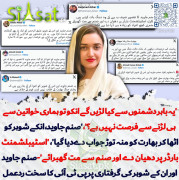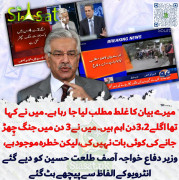QaiserMirza
Chief Minister (5k+ posts)
The Definition Of Interest
The literal meaning of interest or Al-RIBA as it is used in the Arabic language means to excess or increase. In the Islamic terminology interest means effortless profit or that profit which comes free from compensation or that extra earning obtained that is free of exchange. Hazrat Shah Waliullah Dehlvi a great scholar and leader has given a very concise and precise definition of interest. He says,
"Riba` is a loan with the condition that the borrower will return to the lender more than and better than the quantity borrowed."
Interest In Pre-Islamic Times
Interest In Pre-Islamic Times
Hafiz Ibn Hajr writes in his commentary of Sahih Bukhari (Fathul Bari):
"Imam Malik reports on the authority of Zaid Ibn Aslam that in the period of ignorance (pre-Islamic times) interest was changed according to the following scheme. One person had a right in the property of another person.
It may have been a general right because of the amount lent or the price of something purchased or in any other form. A time was set when the claim would be settled. When the appointed time arrived the creditor would ask the debtor if he wanted to settle the claim or pay interest with an extension to the time. If the claim was settled then there was no increase in the payment. Otherwise the debtor would increase the amount payable and the creditor would extend the period further.
(Vol. IV P.264)
"Imam Malik reports on the authority of Zaid Ibn Aslam that in the period of ignorance (pre-Islamic times) interest was changed according to the following scheme. One person had a right in the property of another person.
It may have been a general right because of the amount lent or the price of something purchased or in any other form. A time was set when the claim would be settled. When the appointed time arrived the creditor would ask the debtor if he wanted to settle the claim or pay interest with an extension to the time. If the claim was settled then there was no increase in the payment. Otherwise the debtor would increase the amount payable and the creditor would extend the period further.
(Vol. IV P.264)
Islam’s View Of Trade:
Interest is not a subject without trade and commerce. Islam recognises trade and commerce not only as a lawful profession but also as a moral duty. Islam has laid down a complete set of rules for trade. The reason for these rules is to specify what halal earning is. There are many traditions (Ahaadith) concerning halal provision that can also be found in the books containing the traditions of the prophet (peace be upon him). Actually, Islam has encouraged men to earn their own provision and to provide it to their families. The condition is that the earning has to be according to the conditions set by the Shari’ah. Any sort of transaction that does not correspond to the rules of trade will not be allowed. These rules can be found under the heading of trade in the books of jurisprudence. Interest is amongst those conditions which all dealings must be free from.
How Is Interest Illegal :
The definition of interest has already been mentioned as well as that it is prohibited. If we explore the Qur’an we will come across at least four places where Allah has mentioned interest.
The first one is in Surah Al-baqarah verse no.275
"Those who devour usury will not stand except as stands one whom the Satan by his touch has driven to madness. That is because they say, "trade is like usury", but Allah has permitted trade and has forbidden usury",
In the next verse verse 276 in the same place he says,
"Allah will deprive usury of all blessing, and will give increase for deeds of charity, for he does not love any ungrateful sinner."
"Those who devour usury will not stand except as stands one whom the Satan by his touch has driven to madness. That is because they say, "trade is like usury", but Allah has permitted trade and has forbidden usury",
In the next verse verse 276 in the same place he says,
"Allah will deprive usury of all blessing, and will give increase for deeds of charity, for he does not love any ungrateful sinner."
Two verses later in verse 278 he says,
"Oh you who believe! Fear Allah and give up what remains of your demand for usury if you are indeed believers."
In verse 279 he says,
"Oh you who believe! Fear Allah and give up what remains of your demand for usury if you are indeed believers."
In verse 279 he says,
"If you do not, take notice of war from Allah and his Messenger sallallahu alaihe wasallm but if you repent you shall have your capital sum. Deal not unjustly and you shall not be dealt with unjustly."
In the second place in Surah Aal-Imran, verse no.130 Allah says,
"Oh you who believe! Devour not usury doubled and multiplied; but fear Allah that you may prosper."
"Oh you who believe! Devour not usury doubled and multiplied; but fear Allah that you may prosper."
In the third place in Surah Al-Nisaa’ Allah states in verse 161,
"That they took usury though they were forbidden and they devoured peoples wealth wrongfully; we have prepared for those amongst them who reject faith a grievous chastisement."
"That they took usury though they were forbidden and they devoured peoples wealth wrongfully; we have prepared for those amongst them who reject faith a grievous chastisement."
In the fourth place, Surah Al-Room, verse no.39 Allah mentions
"That which you give in usury for increase through the property of people will have no increase with Allah: but that which you give for charity seeking the countenance of Allah, it is these who will get a recompense multiplied."
"That which you give in usury for increase through the property of people will have no increase with Allah: but that which you give for charity seeking the countenance of Allah, it is these who will get a recompense multiplied."
Ahaadith Concerning Interest :
These ahaadith have been taken from Mishkat-ul-Masabih under the section of interest and the English translation has been taken from its English version written by Al Hajj Moulana Fazl Karim (218-227 vol. II)
Hazrat Jabir radiyallahu anhu has reported that the Messenger of Allah sallallahu alaihe wasallm cursed the devourer of usury, its payer, its scribe and its two witnesses. He also said that they were equal (in sin).
(Muslim)
(Muslim)
Hazrat Abu Hurairah radiyallahu anhu reported that the Holy Prophet sallallahu alaihe wasallm said: A time will certainly come over the people when none will remain who will not devour usury. If he does not devour it, its vapour will overtake him.
(Ahmed, Abu Dawood, Nisai, Ibn Majah.)
(Ahmed, Abu Dawood, Nisai, Ibn Majah.)
Hazrat Abu Hurairah radiyallahu anhu reported that the Messenger of Allah sallallahu alaihe wasallm said : Usury has got seventy divisions. The easiest division of them is a man marrying his mother.
(Ibn Majah)
(Ibn Majah)
Hazrat Abu Hurairah radiyallahu anhu reported that the Messenger of Allah sallallahu alaihe wasallm said: I came across some people in the night in which I was taken to the heavens. Their stomachs were like houses wherein there were serpents, which could be seen from the front of their stomachs. I asked: O Gabriel! Who are these people? He replied these are those who devoured usury.
(Ahmed, Ibn Majah)
(Ahmed, Ibn Majah)
Hazrat Ali radiyallahu anhu reported that he heard the Messenger of Allah sallallahu alaihe wasallm cursing the devourer of usury, its giver, its scribe and one who refuses to give Zakat and he used to forbid mourning.
(Nisai)
(Nisai)
Hazrat Umar bin Al-Khattab radiyallahu anhu reported: the last of what was revealed was the verse of usury. The Messenger of Allah sallallahu alaihe wasallm was taken and he had not explained it to us. So, give up usury and doubt.
(Ibn Majah, Darimi)
(Ibn Majah, Darimi)
Hazrat Abdullah bin Hanzalah radiyallahu anhu (who was washed by the angels) reported that the Messenger of Allah sallallahu alaihe wasallm said: A dirham of usury that a man devours and he knows is greater than 36 fornications.
(Ahmed, Darqutni)
(Ahmed, Darqutni)
Interest From A Jurisprudical View :
We should deeply thank the Sahaabah radiyallahu anhum in their efforts to spread the religion as they learnt it from the Prophet sallallahu alaihe wasallm. Then when the religion started to spread vastly Allah brought about four imams who described the religion in general terms in order to make the common public understand. They spent their lives trying to put the whole religion in a collective form through the Qur’an and the Ahaadith and the concise decisions of the Sahaabah radiyallahu anum. In the case of interest, all four imams established a general rule mainly concentrating on this statement made by the Prophet sallallahu alaihe wasallm.
Hazrat Al-Khudri radiyallahu anhu reported that the Prophet sallallahu alaihe wasallm said: Gold in exchange for gold, silver in exchange for silver, wheat in exchange for wheat, barley in exchange for barley, dates in exchange for dates, salt in exchange for salt is in the same category and (should be exchanged) hand to hand, so who ever adds or demands increase he has practised usury. The giver and taker are the same.
Out of the four imams, Imam Abu Hanifah has ruled that if the measurement system (volumetric or in compounds) is the same and the two items are in the same category, then they should be sold in the same amount and direct not in credit otherwise interest will be found.
Imam Shaf’ee says that if the items are valuable and could be considered food then there is the chance of interest. Imam Malik says that if the items are valuable and are edible then interest is a subject.
ADVICE :
As you may have realised, giving and taking interest is unlawful. Unfortunately, the basis of many of the transactions (especially in banking and insurance), personal or business involve interest. Thus it is becoming increasingly difficult for the majority of the Muslims, especially those who are comercially orientated to abstain from dealings involving interest. Many of us purchase items on ‘Buy now, Pay later' schemes thinking that this sort of scheme is of great benefit to us. Sadly, what we fail to recognize at the time of purchasing this ‘supposed bargain' is the fact that if we fail to pay the required amount at the due time, we will be liable to pay interest.
Now, suppose a couple of months ago, we were purchased an item on a ‘Pay later' scheme in which there was no question about us keeping upto date with payments, however due to a change in our financial situation, we have failed to pay the required amount, and are paying interest now as a result.
We would have joined a group of those unfortunate people who have been cursed by the Prophet Sallallahu Alayhi Wassallam.
Our advice to anyone who is involved in any form of interest is that the individual should minimise his expenditure in these dealings and if possible abstain completely from these transactions. In any case, every individual should continue to seek Allah’s forgiveness. The philosophy shows that a person who takes interest does not gain anything in reality but through the explanation of the Qur’an verse,
" Allah decreases interest and increases sadqah"
That in reality the money just goes to waste and the person does not even realise, and a person who gives money in the path of Allah, in whatever form it may be, actually gains although in reality it seems as though he is loosing out.
That in reality the money just goes to waste and the person does not even realise, and a person who gives money in the path of Allah, in whatever form it may be, actually gains although in reality it seems as though he is loosing out.
Every person should take all necessary precautions in their financial and social dealings. If a person neglects in keeping a watchful eye on financial dealings, this negligence will slowly spread to other aspects of religion. This will have a very detrimental effect on religious matters.
The dealings of usury and interest are not only a disadvantage to us in this world but will also be a source of great discomfort and pain for us in the hereafter. The Prophet Sallallahu Alayhi Wassallam has informed us about the punishment that awaits those people who deal with interest:
“Hazrat Abu Huraira Radhiallaho Anhu has reported the saying of the Prophet Sallallahu Alayhi Wassallam that during his ascension (Mi'raaj), he noticed a group of men whose stomachs were bloated to the size of big rooms and their wanting to move from their positions was impossible. They would be crushed in a stampede by the friends of Fir'awn. The Prophet Sallallahu Alayhi Wassallam seeing their condition asked Hazrat Jibra'eel Alayhis Salaam about their identity. He was informed that they were the people who indulged in dealings of usury and interest.”
The summary of the matter is that interest is hazardous and should be abstained from in all manners. If anybody has a case they wish to solve then they should contact a Mufti and present their problem as it is.
I conclude by asking you my dear reader, is it really worth destroying the eternal life of the hereafter, just so that we may have a few more comforts in a life which can come to an end any moment

![ball[1].gif](/proxy.php?image=http%3A%2F%2Fwww.globalwebpost.com%2Ffarooqm%2Fimages%2Fbuttons%2Fball%5B1%5D.gif&hash=5c478d0ec61165f8bc7a113666650072)



























